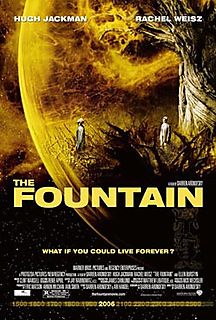 The Fountain is unlike any other studio film you’ll see this year. For that matter, it’s unlike any American film you’ll see any time soon. For this third feature, Darren Aronofsky has created a subtle, potent poem about grace, resonance and death. Recently re-rated from R to PG-13, with a few small alterations, Aronofsky passed through Atlanta to interact with audiences and show off the new cut. We sat down for an hour, during which he not only divulged a tidbit about his next project, but slowly elaborated on his own unique approach to making a film that eschews typical characters, plotting and cheese.
The Fountain is unlike any other studio film you’ll see this year. For that matter, it’s unlike any American film you’ll see any time soon. For this third feature, Darren Aronofsky has created a subtle, potent poem about grace, resonance and death. Recently re-rated from R to PG-13, with a few small alterations, Aronofsky passed through Atlanta to interact with audiences and show off the new cut. We sat down for an hour, during which he not only divulged a tidbit about his next project, but slowly elaborated on his own unique approach to making a film that eschews typical characters, plotting and cheese.
First off, what’s different between the two versions of the film, the R-rated that we saw at festivals and the PG-13 that will be in theatres?
It’s very slight. About 4 months ago I had been…there was a line I wanted in the movie that’s in the trailer that Hugh and I wanted in the film and I couldn’t figure out how to use. And I figured it out a few months ago and got it in. It’s right at the beginning of the third act, it’s a slight change adding one line and switching the order of two scenes. What happened is that I moved away from the script, and now it’s actually how the script was. And I think what happened is, at the time, I couldn’t figure it out and I think we did choose the right solution, but having time to figure it out it finally clicked. It doesn’t change things much, but it makes me feel better.
There are such little things when you make a film, and I’m not sure if I’m being obsessive, or if it’s almost like getting the note exactly right if you’re a musician. Like tuning very slightly and getting the key exactly right. I don’t think anyone else would really notice the difference, but it keeps me awake at night. Every one of my films has always had a little key that was slightly off. Probably if I looked back at Pi and Requiem now there would be a lot of things off but that’s always going to happen as you move forward. But they’re never quite perfect. But I think maybe that’s OK. Out of that imperfection can be some good things, as long as you nail down the ones that keep you awake.
There’s a big gulf in music between being a technical perfectionist and playing by feel. Is there a similar balance for you in filmmaking?
I think that the truth of a scene goes above the technical considerations or limitations. Technically, as filmmakers, you’re always going to make mistakes, but if there’s something emotionally resonant it’ll work anyway. A perfect example is the Ellen Burstyn scene in Requiem where she’s talking to Jared, saying "I’m old", giving her big speech. That scene is actually soft — slightly out of focus. You can’t see it on DVD, but you can on film. She’s right on the edge of the focus line. She buzzes in and out.
It was a huge thing when we did it, because I knew it was her best performance, and the fact that it wasn’t sharp killed me. I think we fired the first AC over it — you have to, because you have to protect the actors and let them know that their performances will be  captured well. But while I was doing Requiem, every night as I went to sleep I’d watch Seven Samurai. And there’s a scene with Mifune that’s actually slightly soft, but Kurosawa kept it. And not to say — by any means! — that Requiem is anything near, or could kiss the feet of Seven Samurai, but that a filmmaker like him had the same problem allowed me to live with it. And now no one notices it but me.
captured well. But while I was doing Requiem, every night as I went to sleep I’d watch Seven Samurai. And there’s a scene with Mifune that’s actually slightly soft, but Kurosawa kept it. And not to say — by any means! — that Requiem is anything near, or could kiss the feet of Seven Samurai, but that a filmmaker like him had the same problem allowed me to live with it. And now no one notices it but me.
Are little things like the changed line in the new cut even more important in a movie that’s not traditionally narrative?
I think so. I think it’s important to give this audience all the right clues to point them in the right direction. The Fountain is more of a poem than it is a typical narrative film. All those narrative elements are in there, but it’s just because of how we do things that end up making it more abstract. I think if you gave me a very normal, straightforward film, and me and these filmmakers were to attack it, the result would be very abstract! I don’t know why that is, it’s just how we do things.
Most filmmakers, answering that question, would say it’s just how I do things. How much of what the audience thinks of as ‘you’ is actually all these people working in concert?
The writer/director often gets most of the credit, or the most shame for a film. But it’s always a collaboration, and it’s totally a team sport. I never forget that.
There are moments of this film that resonate back to Requiem, in terms of technique, but I got the sense that you were trying to develop a new language.
Yes, for two reasons. One is that every film has it’s own grammar. It’s my job to figure out what the themes are and to put the camera in the right place and inspire the lighting. The reason that Pi and Requiem are so similar, and one of the main reasons I wanted to do Requiem, was that it was very connected to Pi, also a subjective movie, but with four characters to explore instead of one. And having more money, I was very excited to do these things that I wasn’t allowed to do the first time. So Requiem allowed me to complete the language we started in Pi.
Afterwards, the thinking was very specific: that’s done; we’ve explored all those techniques, and now it’s time for something different. So here we’ve made a very conscious effort to rely on new techniques, and not simply fall back on what we’ve done before.
Part of your consistent film language is practical effects. Was that a problem, going into a larger studio film?
Warner Brothers was considering how hard some things are to do, when you shake up the normal ways of doing things. But they were very open to it, and I think one of the reasons they greenlit it a second time was because of the effects footage we had shot. They got it, and realized the stuff we were working with was unlike anything they’d seen before. And it’s extremely economical. But taking old techniques and reusing them, which is something I’ve always liked doing, while cheap, also represents a large risk, and studios don’t like that at all. Whose job gets lost if it doesn’t work?
You’ve taken three big chances. You’ve managed to make each of them work so far — what are your fears with this one?
I don’t think it’s always about taking chances, but it’s that what I think is interesting and cool and am passionate about telling tend to fall into the riskier category. No one wanted to make a black and white movie like Pi, and on paper Requiem was just another drug movie. This is a love poem to death. I imagine I’ll do something easier eventually. I’d love to do a sports movie or do something straightforward. And that’s why I wanted to get involved with Lost, because I was excited to just show up and get to work, just to direct. And not even worry about the writing, since the story is by the dungeon masters on site. I do enjoy just directing and working with actors, but I haven’t had, or I haven’t made that opportunity.
It’s amazing that TV is turning into a place where people like yourself can do that.
I think it’s very cool. The problem is that it still ends up taking a lot of time. It’s far more than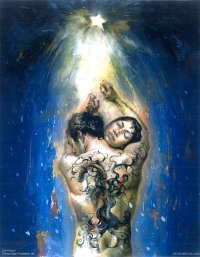 a week, the Lost episode was something like 30 days in Hawaii, and with a wife seven months pregnant that just wasn’t going to work.
a week, the Lost episode was something like 30 days in Hawaii, and with a wife seven months pregnant that just wasn’t going to work.
As you continued to work on The Fountain over the past year, did your approach to it change after the birth of your child?
I think that Henry’s birth will totally impact me on my next project, or on future projects. There’s one thing we’re writing right now, which I haven’t announced, which is totally about birth. And it just works out that way…you’re writing and suddenly you realize where it came from.
And The Fountain, as I’ve talked about, came from turning 30. It’s a very young age, but it’s the first time that a real number is on you that you can’t escape. Your friends start getting cancer, and one day you’ll be 50, and maybe you’ll get to be 80.
You make films with central characters who aren’t traditionally likable. Did you consider showing Tom before Izzy got sick, when he was less obsessed and more amiable?
We talked about it, but…I’ve got these cheese antennas. I’ve never been into that. There’s not a name for that scene, but we all know it, where you see a couple doing something that’s just a cute little thing between them. Every movie does it. Some directors pull it off better, but I can’t stand it. The bile rises up into the back of my throat, because it’s such an obvious technique.
My biggest influence is probably cartoons, because I grew up on those, and I think the characters I write are very symbolic, and that’s why I think the film becomes more of a fairy tale. And they don’t have to be likeable. But they’re very symbolic, my characters. And I always saw Hugh’s character as ‘Man’ and Rachel’s as ‘Woman’. And to me the details of what makes their relationship silly or whatever, I just didn’t want to go there. For me, the snowball is the furthest I went. I didn’t want to go any further. And that was hard for me. Because I just hate cheese! And to me it’s not about that. It’s really about what’s happening to them in the moment. It’s interesting to me, because Izzy is so close to the end when we meet her, and to get to a place where you’re able to face what’s in front of you with grace, you’ve got to be pretty far along on your spiritual journey. And that’s a very hard character to play. Because Rachel had to be 95% there and 5% terrified. So it’s a hard balance, and certain people miss the terror, but it’s there.
You mentioned cartoons, which leads to the reality that people in their 30’s now are almost consciously infantile in the way they revere what they liked as children. Have you consciously evolved away from your childhood influences?
I think Rachel beats me up on a lot of my childhood obsessions, but I’m still…well, I’m still best friends with guys I met in nursery school. Loyalty to me is one of the most important things. I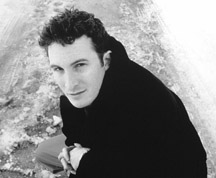 was best man at a wedding for a guy I met when we were on tricycles, and he’s the godfather of my child. I have a big connection to my old neighborhood. Memories of that time are very important. And I don’t know…I don’t think there’s anything wrong with that. I do hate when we sit around and it’s all about nostalgia, because I like to be in the moment with my friends.
was best man at a wedding for a guy I met when we were on tricycles, and he’s the godfather of my child. I have a big connection to my old neighborhood. Memories of that time are very important. And I don’t know…I don’t think there’s anything wrong with that. I do hate when we sit around and it’s all about nostalgia, because I like to be in the moment with my friends.
Perhaps it’s that, while you’ve got a very current connection to your past, many of us don’t, and so we use Star Wars fandom as a surrogate for the connections we’ve lost.
Right, so all those things stand in. I think the nice thing about having grown up in one place is that there’s an almost root-like conduit of energy I get from there. I still go back, and I feel this energy from the earth that inspires me. That’s why I brought Requiem back down there.
Is there anything that you do ritualistically as you write to tap into that energy?
It’s not connected to that, specifically. I think the best thing to describe my writing is that I’m a nomadic writer. I need to go to a new space every two weeks, because otherwise I’ll find things to help me procrastinate. I need to be uncomfortable when I write. Otherwise I’ll lay in bed forever…if I’m comfortable I’ll watch TV or surf the internet. But if I’m uncomfortable it forces me to do the work.
Which is the antithesis of what most writers say — they want their comfortable routine.
But I’m not a writer. I’m a dilettante when it comes to writing. But there are moments. There are those times when it’s great as I’m writing, but most of the time it’s really painful. It’s hard to sit down and to do the work. I’m much more of a collaborator. My favorite part is working with actors. That’s always the best part.
How much changes as you get together with actors?
With dialogue, not much, because we did spend a lot of time on the dialogue. Because we spent five years writing, we realized that every line has real significance if we tried to lose it. There’s very little dialogue in the film and if you take out some lines or changed them, it caused problems. There was one actor I had, who I won’t name, who wanted to change everything. And it was very, very difficult. I tried to help him, but as soon as we started to change things I realized all the impact it had further down the line that messed up other scenes. But as far as how a line is delivered, I hope that an actor will enlighten me about how to do something.
Solaris keeps coming to mind for me, as I think about The Fountain.
The Tarkovsky one, I hope!
Both! I like the Soderbergh one a lot, actually.
You know, I didn’t see either one. So I don’t know. Everyone keeps bringing up the Tarkovsky version, but I was never a big Tarkovsky fan. Now I feel like I should check him out.
Few movies manage to successfully discuss death and a graceful acceptance of it, and the resonance of decisions. Solaris and The Fountain are two of them.
Someone was telling me about the water imagery, and similarities there. But I will watch it — I should see it on film at this point.
The Soderbergh version was a quiet, ambitious film that didn’t do well. Are you worried that The Fountain will be similar commercially?
I think it had an impact on us, actually, because it came out very close to us getting shut down the first time. And I wonder if there was a relationship or whisperings of a connection. Nothing was ever direct, but it’s hard not to wonder. Of course I want The Fountain to do well…my only concern is that, looking at Requiem, which only made three million at the box office, now you go around and it seems like everyone has seen it. So I’m hoping that the same thing doesn’t happen with The Fountain. But this is a very different type of movie and the problem is that you have to perform in the first weekend. I hope that the conversations about this movie happen quickly and drive people to see it. But Warners has been very supportive. All this studio stuff is so new to me, that I have no idea what anything really means. It’s a very hard time right now.
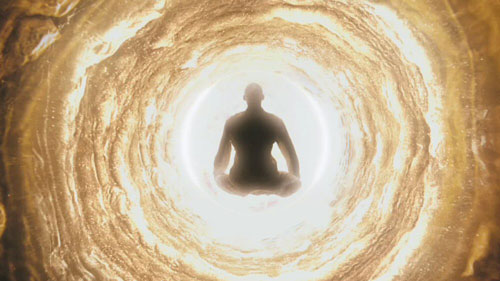
How did you feel about the reception to the film at Toronto versus Venice?
Well, I think if anything we’re getting really heated responses. That’s exciting to me. And that’s what happened at that fucking first screening in Venice, was there was a fight between two journalists. That to me was the story. Not that some people booed and some applauded. It’s that there was a fight, that they got into it like that.
Few films inspire that sort of response.
Rarely! How often do you walk out of a movie and really have an argument about whether something was great or terrible? It happens…Dancer in the Dark was like that. Lars von Trier does that a lot to people. Lilya 4-ever, those are films that really juice me up. Great filmmakers taking chances. Why bat .150 when you can swing for the fences? I think that’s what’s interesting…you don’t want someone to say ‘he didn’t connect on the bunt’! You don’t want to half-ass it. Those are the ones that inspire me.
What else is inspiring you right now?
(long pause.) You know, there’s very little out there that is really inspirational right now, and that’s very upsetting. It seems like everyone is interested in Paris Hilton. We’ve got an era of superficiality. That’s the focus. It’s a shame that I can’t name one inspiration political figure out there. Nelson Mandela? That’s all we’ve got left. There are so few whose integrity you can buy. Music-wise, I’m still listening to Johnny Cash, who I’ve listened to all summer, and he’s always inspirational. I think the last band that really inspired me was Sleater Kinney. I really loved their energy; they just went for it. There are filmmakers who are doing stuff…Lucas Moodysson. For me, A Hole In My Heart was just way too much, but still, he went for it! The Dardenne Brothers are fantastic. Fincher is trying to do it right. Alfonso [Cuaron] and [Alejandro González] Iñárritu are great. They’re really pushing it. I think it’s an interesting time; there are filmmakers who are trying to be very truthful.
Responses to movies are changing, too. Is the personalization through DVD and lack of a communal experience fragmenting it?
There is a benefit, that people can watch things over and over again. That’s one of the reasons we were confident that we could fill The Fountain with so much detail. It seems like in this Lost generation, people are interested in the connections and different threads. So it’s not all bad.
But I have no way to gauge these things, sometime. When I go into a screening I’m just the guy who made Requiem For A Dream, and afterwards it’s something very different. And the audience for The Fountain is very different from the Requiem audience. I think there are people in that base who will like it, but…there have always been Pi fans and Requiem fans, and sometimes they overlap, but typically there are very clear camps. They’ll enthuse over one and not even mention the other. But this is very different, and I think there will be a new, unique audience for it. Do you think that?
I think it might be those audience grown up, who have gone through the same milestones you have, and then hopefully expand from there.
Possibly. But the amazing thing is that Requiem is still being discovered by all these 15-year olds. All over the country I hear from them, and I think, ‘you’re not supposed to be watching this!’ NC-17, baby!
Two part question: Will you do another studio film, and is Lone Wolf and Cub really dead?
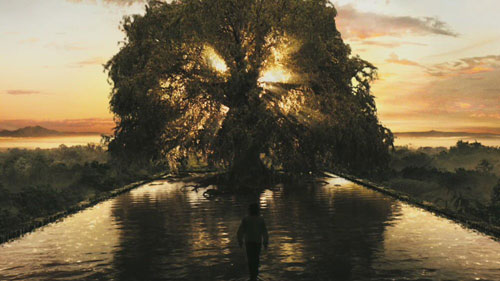
Well, the thing we’re writing that’s big is a studio film. Lone Wolf, Paramount never got the rights. And we developed a script, but now the rights don’t exist.
That was so exciting for a moment there.
The new thing is even more exciting, and I’ll give you an exclusive. I’m not going to tell you exactly what it is, but…it’s a biblical epic.
In…Aramaic?
(laughs) In English!
What led you to that?
It’s something I’ve wanted to do for a long time. Before Pi. Probably ten years ago, I had an idea. Actually, I wrote a poem about it when I was in 7th grade. I won this award for it — my first writing award. So it’s a story from the Bible that kind of stuck with me. About ten years ago I was at a museum that featured an exhibit that reminded me of it. So we’ve been trying to crack it for a while, and we finally figured out a direction. But…I can’t tell you any more.
Very often, when a filmmaker gets to do the project they’ve wanted to do for a decade, it fails. Are you afraid of that?
That’s…I call that the fingerpaint syndrome. Remember when you were in kindergarten and you were painting, if you kept going too long it started to turn brown? So I’m always asking my crew, ‘are we going brown here?’. And that was the challenge with The Fountain, and with anything you work on, and it’ll be a challenge here too.